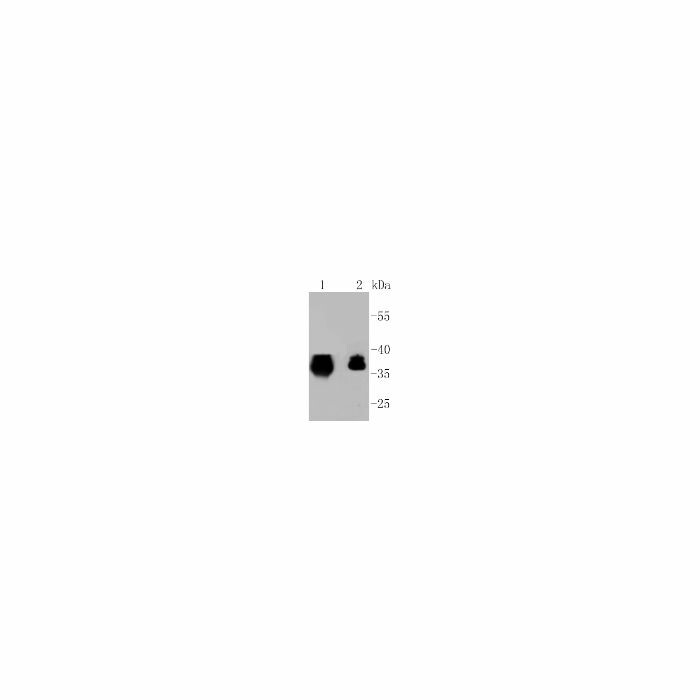CD326 (EPCAM) (clone ), anti-human, mouse, rat
€428.00
In stock
SKU
BS9918M
Background:
The epithelial cell adhesion molecule Ep-CAM, which is also design atedtumor-associated calcium signal transducer 1 and MK-1, is a monomeric membrane glycoprotein that is expressed in most normal human epithelium and in most carcinomas. The human Ep-CAM gene encodes a 314 amino acid protein that is expressed as two forms, a 40 kDa major form and a 42 kDa minor form, which are reduced to 35 kDa upon treatment with the aminoglycosylation inhibitor tunicamycin. Ep-CAM is overexpressed in a variety of carcinomas and is, therefore, a potential target for the visualization and therapy of human solid tumours. Ep-CAM contains an extracellular domain containing two epidermal growth factor-like repeats, followed by a cysteinepoor region, which are necessary for the adhesion properties of the molecule.
Alternative Name:
Epithelial cell adhesion molecule, Ep-CAM, Adenocarcinoma-associated antigen, Cell surface glycoprotein Trop-1, Epithelial cell surface antigen, Epithelial glycoprotein, EGP, Epithelial glycoprotein 314, EGP314, hEGP314, KS 1/4 antigen, KSA, Major gastrointestinal tumor-associated protein GA733-2, Tumor-associated calcium signal transducer 1, CD326, EPCAM, GA733-2, M1S2, M4S1, MIC18, TACSTD1, TROP1
Application Dilution: WB: 1:1000-1:5000
Specificity: This antibody detects endogenous levels of EPCAM and does not cross-react with related proteins.
Immunogen:
Recombinant antibody.
MW: ~ 40 kDa
Swis Prot.: P16422
Purification & Purity:
Protein A affinity purified
Format:
Recombinant Rabbit Monoclonal Antibody. 1*TBS (pH7.4), 1%BSA, 40%Glycerol. Preservative: 0.05% Sodium Azide.
Storage:
Store at 4°C short term. Aliquot and store at -20°C long term. Avoid freeze-thaw cycles.
For research use only, not for use in diagnostic procedure.
The epithelial cell adhesion molecule Ep-CAM, which is also design atedtumor-associated calcium signal transducer 1 and MK-1, is a monomeric membrane glycoprotein that is expressed in most normal human epithelium and in most carcinomas. The human Ep-CAM gene encodes a 314 amino acid protein that is expressed as two forms, a 40 kDa major form and a 42 kDa minor form, which are reduced to 35 kDa upon treatment with the aminoglycosylation inhibitor tunicamycin. Ep-CAM is overexpressed in a variety of carcinomas and is, therefore, a potential target for the visualization and therapy of human solid tumours. Ep-CAM contains an extracellular domain containing two epidermal growth factor-like repeats, followed by a cysteinepoor region, which are necessary for the adhesion properties of the molecule.
Alternative Name:
Epithelial cell adhesion molecule, Ep-CAM, Adenocarcinoma-associated antigen, Cell surface glycoprotein Trop-1, Epithelial cell surface antigen, Epithelial glycoprotein, EGP, Epithelial glycoprotein 314, EGP314, hEGP314, KS 1/4 antigen, KSA, Major gastrointestinal tumor-associated protein GA733-2, Tumor-associated calcium signal transducer 1, CD326, EPCAM, GA733-2, M1S2, M4S1, MIC18, TACSTD1, TROP1
Application Dilution: WB: 1:1000-1:5000
Specificity: This antibody detects endogenous levels of EPCAM and does not cross-react with related proteins.
Immunogen:
Recombinant antibody.
MW: ~ 40 kDa
Swis Prot.: P16422
Purification & Purity:
Protein A affinity purified
Format:
Recombinant Rabbit Monoclonal Antibody. 1*TBS (pH7.4), 1%BSA, 40%Glycerol. Preservative: 0.05% Sodium Azide.
Storage:
Store at 4°C short term. Aliquot and store at -20°C long term. Avoid freeze-thaw cycles.
For research use only, not for use in diagnostic procedure.
| Is Featured? | No |
|---|
Write Your Own Review

